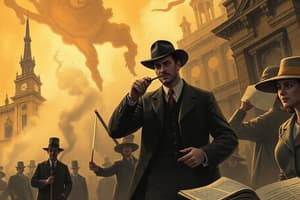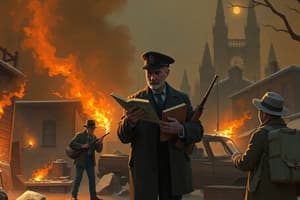Podcast
Questions and Answers
What significant action did Nixon take on July 18, 1973?
What significant action did Nixon take on July 18, 1973?
- He publicly claimed he was innocent of any wrongdoing.
- He released the transcripts of his recorded conversations.
- He ordered the White House taping system disconnected. (correct)
- He resigned from the presidency.
What was the outcome of the Supreme Court ruling on July 24, 1974?
What was the outcome of the Supreme Court ruling on July 24, 1974?
- It upheld Nixon's claim of executive privilege.
- It dismissed all charges against Nixon.
- It mandated Nixon to turn over White House tape recordings. (correct)
- It required Nixon to provide additional edited transcripts.
What major event occurred during the Saturday Night Massacre?
What major event occurred during the Saturday Night Massacre?
- Nixon ordered the taping system be reconnected.
- Nixon announced his intent to resign.
- Nixon fired Archibald Cox and abolished the office of the special prosecutor. (correct)
- Chief of staff Haig revealed erased tapes.
How did Nixon respond to the mounting pressure for impeachment on November 17, 1973?
How did Nixon respond to the mounting pressure for impeachment on November 17, 1973?
What critical gap was discovered in one of the Nixon tapes on December 7, 1973?
What critical gap was discovered in one of the Nixon tapes on December 7, 1973?
What major legislation was influenced by muckraking exposés about corporate monopolies?
What major legislation was influenced by muckraking exposés about corporate monopolies?
Which reform was established due to muckraking efforts in the early 1900s?
Which reform was established due to muckraking efforts in the early 1900s?
Which journalist investigated the My Lai Massacre in 1969?
Which journalist investigated the My Lai Massacre in 1969?
What was a consequence of muckraking during wartime?
What was a consequence of muckraking during wartime?
What type of journalistic norms became primary from 1917 to 1970?
What type of journalistic norms became primary from 1917 to 1970?
What major exposé was published in Rachel Carson's 'Silent Spring'?
What major exposé was published in Rachel Carson's 'Silent Spring'?
What was one reason for the decline of investigative reporting between 1960 and 1970?
What was one reason for the decline of investigative reporting between 1960 and 1970?
Which investigative report examined civil liberties violations by the FBI?
Which investigative report examined civil liberties violations by the FBI?
What significant event led to Neil Sheenan questioning American foreign policy?
What significant event led to Neil Sheenan questioning American foreign policy?
Which prize did Neil Sheenan and The New York Times win for their efforts related to the Pentagon Papers?
Which prize did Neil Sheenan and The New York Times win for their efforts related to the Pentagon Papers?
What was the White House's response to the publication of the Pentagon Papers?
What was the White House's response to the publication of the Pentagon Papers?
What scandal involved the burglary of the Democratic National Committee headquarters?
What scandal involved the burglary of the Democratic National Committee headquarters?
Which journalists were instrumental in uncovering the Watergate Scandal?
Which journalists were instrumental in uncovering the Watergate Scandal?
What training had Richard Nixon undergone before reclaiming the presidency?
What training had Richard Nixon undergone before reclaiming the presidency?
What was the purpose of the White House 'plumbers' unit?
What was the purpose of the White House 'plumbers' unit?
What was the main outcome of the Supreme Court's ruling regarding the Pentagon Papers?
What was the main outcome of the Supreme Court's ruling regarding the Pentagon Papers?
What was the primary goal of the Watergate break-in?
What was the primary goal of the Watergate break-in?
Who denied any connection to the Watergate operation in June 1972?
Who denied any connection to the Watergate operation in June 1972?
What significant event occurred on November 11, 1972?
What significant event occurred on November 11, 1972?
Which of the following individuals was convicted in relation to the Watergate incident in January 1973?
Which of the following individuals was convicted in relation to the Watergate incident in January 1973?
What did the FBI establish about the Watergate break-in in October 1972?
What did the FBI establish about the Watergate break-in in October 1972?
What did John Dean reveal during the Watergate investigation in June 1973?
What did John Dean reveal during the Watergate investigation in June 1973?
What did the Senate Watergate committee do on May 18, 1973?
What did the Senate Watergate committee do on May 18, 1973?
Who was appointed as the special prosecutor for Watergate by Attorney General-designate Elliot Richardson?
Who was appointed as the special prosecutor for Watergate by Attorney General-designate Elliot Richardson?
Flashcards
Muckraking
Muckraking
A period of investigative journalism in the early 20th century, characterized by exposing corruption and social injustices.
How did muckraking impact the enforcement of the Sherman Antitrust Act?
How did muckraking impact the enforcement of the Sherman Antitrust Act?
The Sherman Antitrust Act is a United States federal law that prohibits monopolies and cartels.
What impact did muckraking have on labor laws?
What impact did muckraking have on labor laws?
Workman's compensation laws provide financial assistance to employees injured on the job.
How did muckraking influence social welfare programs?
How did muckraking influence social welfare programs?
Signup and view all the flashcards
Wartime Patriotism
Wartime Patriotism
Signup and view all the flashcards
Objective Journalism in Wartime
Objective Journalism in Wartime
Signup and view all the flashcards
My Lai Massacre
My Lai Massacre
Signup and view all the flashcards
Rebirth of Investigative Reporting
Rebirth of Investigative Reporting
Signup and view all the flashcards
Nixon's Taping System Revealed
Nixon's Taping System Revealed
Signup and view all the flashcards
Nixon's Refusal to Release Tapes
Nixon's Refusal to Release Tapes
Signup and view all the flashcards
Saturday Night Massacre
Saturday Night Massacre
Signup and view all the flashcards
Supreme Court Ruling on Tapes
Supreme Court Ruling on Tapes
Signup and view all the flashcards
Nixon's Impeachment (First Article)
Nixon's Impeachment (First Article)
Signup and view all the flashcards
What was the Watergate scandal?
What was the Watergate scandal?
Signup and view all the flashcards
What was the purpose of the Watergate break-in?
What was the purpose of the Watergate break-in?
Signup and view all the flashcards
What was the Senate Watergate Committee?
What was the Senate Watergate Committee?
Signup and view all the flashcards
Who was John Dean?
Who was John Dean?
Signup and view all the flashcards
What was the ultimate outcome of the Watergate scandal?
What was the ultimate outcome of the Watergate scandal?
Signup and view all the flashcards
Why did Nixon resign?
Why did Nixon resign?
Signup and view all the flashcards
What was the significance of the Watergate scandal?
What was the significance of the Watergate scandal?
Signup and view all the flashcards
What was the long-term impact of the Watergate scandal?
What was the long-term impact of the Watergate scandal?
Signup and view all the flashcards
What were the Pentagon Papers?
What were the Pentagon Papers?
Signup and view all the flashcards
What was the impact of publishing the Pentagon Papers?
What was the impact of publishing the Pentagon Papers?
Signup and view all the flashcards
Who were the "plumbers" unit?
Who were the "plumbers" unit?
Signup and view all the flashcards
How did the Washington Post contribute to uncovering Watergate?
How did the Washington Post contribute to uncovering Watergate?
Signup and view all the flashcards
What were the societal effects of the Watergate scandal?
What were the societal effects of the Watergate scandal?
Signup and view all the flashcards
Who was Richard Nixon and when was he elected President?
Who was Richard Nixon and when was he elected President?
Signup and view all the flashcards
Study Notes
Consequences of Muckraking
- Investigative journalism exposed corporate monopolies, leading to the enforcement of the Sherman Anti-trust Act.
- The distribution of wealth was revealed, prompting a constitutional amendment to create federal income taxes in 1909.
- Workman's compensation laws were enacted by 1915.
- Mother's pension laws were established between 1908 and 1913.
- Direct election of U.S. Senators and changes in state laws were also facilitated by muckraking.
- Muckraking crusades directly influenced the implementation of crucial reforms.
Wartime Muckraking
- WWI, WWII, and the Cold War fostered patriotism and public support for government.
- From 1917 to 1970, media competition stabilized, prioritizing objectivity and deference to authority in journalism.
- Notable wartime muckraking events included the Teapot Dome scandal (1922), exposés on race relations and farm labor (1930s-1940s), examinations of Senator Joseph McCarthy's activities (1954), the misconduct of Eisenhower aide Sherman Adams (1958), investigations into the plight of migrant workers (1950s), government corruption in Georgia, violations of civil liberties, and conditions at the Milledgeville State Hospital (by Los Angeles Times Washington correspondent Jack Nelson), and an exposé about the dangers of pesticides (Silent Spring, by Rachel Carson).
Between 1960 and 1970
- Investigative reporting declined due to the popularity of President Kennedy and Lyndon B. Johnson's victory in 1964, strengthening political legitimacy and the economic prosperity of the era.
- A decline in newspapers and a shift in broadcast media's emphasis on news coverage also contributed to a decrease in investigative reporting during this period.
Rebirth of Investigative Reporting
- In 1969, Seymour Hersh, an anti-Vietnam War activist, investigated Lieutenant William L. Calley, Jr., and exposed the deliberate murder of at least 109 Vietnamese civilians in the My Lai hamlet. He won a Pulitzer Prize in 1970 for his work.
The Pentagon Papers
- In March 1971, Neil Sheehan (reporter, NYT) uncovered leaked government documents about the Vietnam War, revealing that top government officials had repeatedly misled the public.
- The Nixon administration attempted to suppress publication, but the Supreme Court ruled in favor of the newspaper.
- Sheehan's work and the Pentagon Papers led to the award of the Pulitzer Prize to both Sheehan and the newspaper.
The Watergate Scandal (1972)
- The public outrage over the Vietnam War and the exposure of the Pentagon Papers led to increased attention on the Watergate scandal.
- Bob Woodward and Carl Bernstein of The Washington Post played a leading role in uncovering the Watergate scandal.
- The scandal focused on the break-in at the Democratic National Committee headquarters in the Watergate Hotel and the subsequent cover-up efforts by high-ranking officials within the Nixon administration.
- The scandal involved the FBI, CIA, Department of Justice, White House and the US. Administration.
Watergate - Brief Timeline of Events (1968-1974)
- Key events related to the Watergate scandal are listed, offering a chronological overview of the investigation and subsequent fallout.
- The timeline includes details on Nixon's re-election, domestic intelligence-gathering plans, the Pentagon Papers' publication, the Watergate break-in, political spying, and Nixon's reelection victory.
- Important dates and figures from the Watergate investigation are provided for further study, including arrests, resignations, and the Supreme Court's ruling.
- The timeline highlights Nixon's eventual resignation and pardoning by Vice President Gerald Ford.
Studying That Suits You
Use AI to generate personalized quizzes and flashcards to suit your learning preferences.




